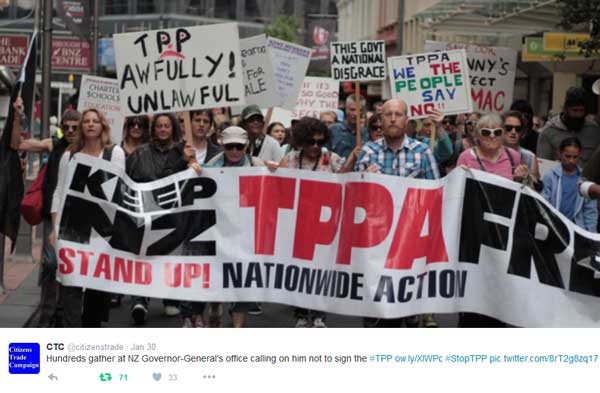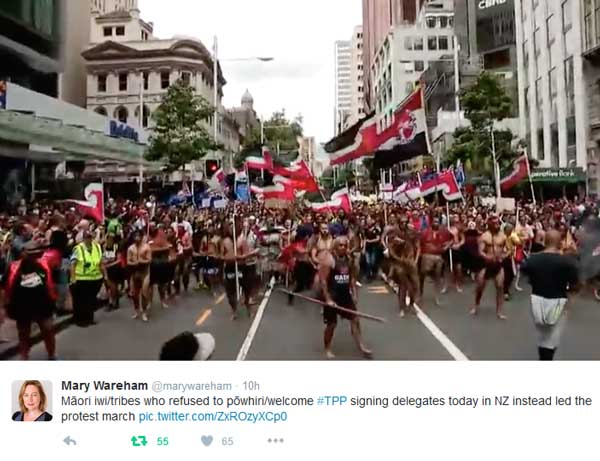Like this article? rabble is reader-supported journalism. Chip in to keep stories like these coming.
As Canadian trade minister Chrystia Freeland signed the Trans-Pacific Partnership (TPP) in Auckland yesterday, more than 1,000 people shut down the central part of the city in protest against the deal.
The New Zealand Herald reports, “Central Auckland grounded to a halt as trade ministers signed the TPP. All streets around Sky City Convention Centre [where the TPP was being signed] and motorway on and off ramps leading to the central business district were blocked by protesters.” The BBC adds, “In the lead up to Thursday’s signing, the streets around Auckland’s central business district were disrupted by groups blocking access to the Auckland Harbour Bridge. Police clashed with some protesters, who have widely claimed the deal will benefit big business rather than workers.”
And a Reuters report in the Globe and Mail’s coverage of the signing notes, “There is wide spread grassroots opposition to the TPP in many countries. Opponents have criticized the secrecy surrounding TPP talks, raised concerns about reduced access to things like affordable medicines, and a clause which allows foreign investors the right to sue if they feel their profits have been impacted by a law or policy in the host country. In New Zealand on Thursday more than 1,000 protesters caused traffic disruptions in and around Auckland and police said a large number of police have been deployed.”
The Council of Canadians expresses solidarity with those who protested yesterday.

While the Trudeau government says signing the TPP is not the same as ratifying it into law, their “public consultation” email responses show they are clearly defending it.
Job losses
They say:“Our government supports free trade — it will help to open markets to Canadian goods and services, grow Canadian businesses, create good-paying jobs, and provide choice to Canadian consumers.”
We say: A study by Tufts University found that the TPP will cost Canada 58,000 jobs and increase income inequality. An EKOS poll in October 2015 found that 61 per cent of Canadians believe the TPP will mean job losses in Canada, with just 24 per cent disagreeing with that statement.
ISDS
They say: “With respect to Investor-State Dispute Settlement (ISDS), the TPP will not impair the ability of Canada or its partners to regulate and legislate in areas such as the environment, culture, safety, health and conservation. Our experience under the NAFTA demonstrates that neither our investment protection rules nor the ISDS mechanism constrain any level of government from regulating in the public interest.”
We say: Canada has been subject to 35-plus NAFTA investor-state claims since the deal came into force on Jan. 1, 1994. Sixty three per cent of those claims have involved challenges to environmental protection or resource management measures.
Drug patents
They say: “Regarding drug patents, the TPP affirms the World Trade Organization Doha Declaration on the TRIPS (Trade-Related Aspects of Intellectual Property Rights) Agreement and Public Health to ensure access to life-saving medicines in public health emergencies.”
We say: The TPP establishes for highly profitable transnational pharmaceutical corporations a five-year minimum period of exclusive rights to sell expensive life-saving bioligics. In her comments on the TPP, the director-general of the World Health Organization has stated, “If these agreements open trade yet close the door to affordable medicines we have to ask the question: is this really progress at all.”
BGH
They say: “With regards to bovine growth hormone (rBST), Health Canada has determined, in 1999, that rBST does not pose a health risk to humans. There is no scientific basis for restricting trade in milk or dairy products from trading partners that have approved rBST. …All food products, both domestic and imported, must meet Canada’s robust health and safety regulation.”
We say: It’s illegal in Canada to administer BGH to cows to boost their milk production, whereas in the United States there is no such restriction. The TPP opens up 3.25 per cent of the Canadian dairy market to milk imports that could be tainted with BGH. There is no plan to separate or label this milk. An Environics poll in July 2015 found that 87 per cent of Canadians were either very or somewhat concerned about the TPP lowering Canadian food safety and quality standards.
To e-mail the government about the TPP, send your questions and comments to [email protected]. To send a letter to the prime minister to demand a real public consultation, please click on our action alert here.
Photos: Twitter photos of yesterday’s protests against the TPP in Auckland.
Like this article? rabble is reader-supported journalism. Chip in to keep stories like these coming.



